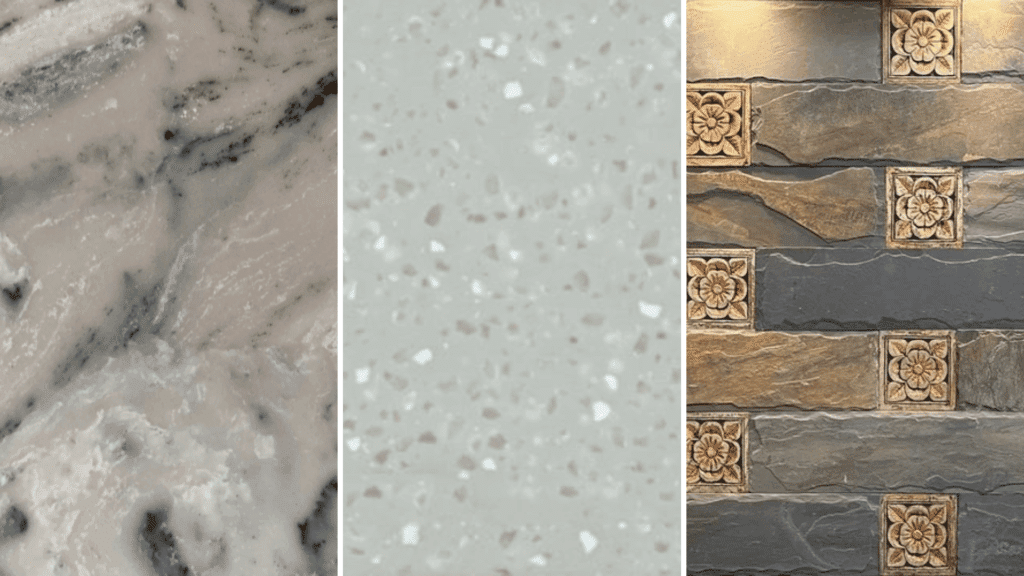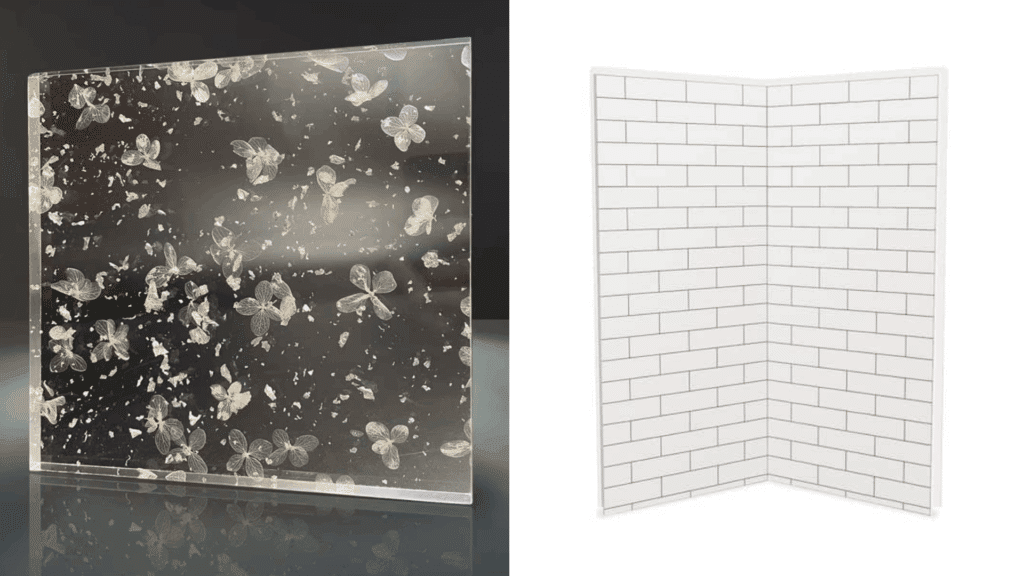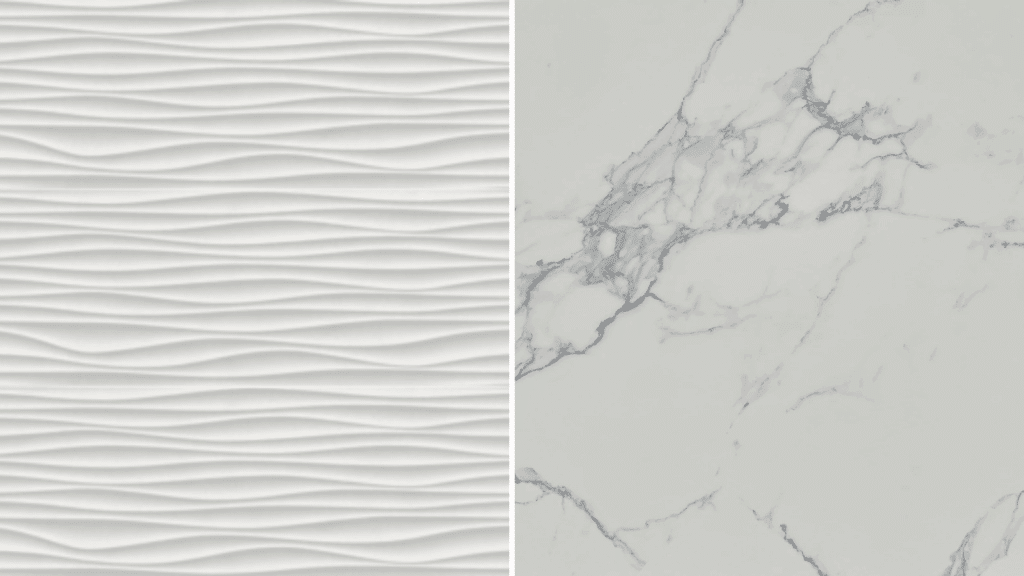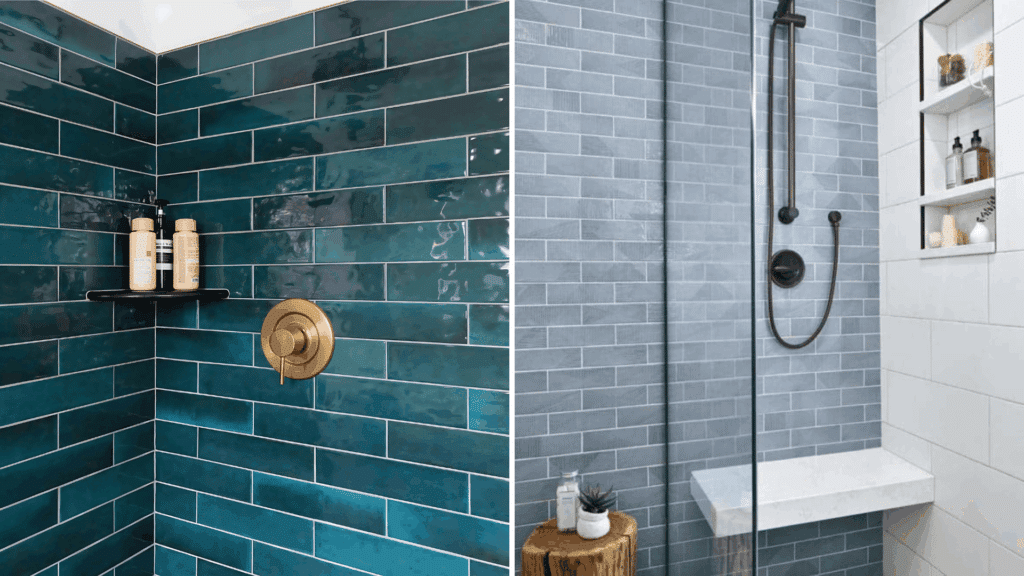If you ask me, choosing the right material for your shower walls can feel way trickier than it should be.
There are so many options – tile, panels, acrylic, fiberglass, glass, and stone-it’s easy to get overwhelmed. But here’s the good news: once you understand the pros, cons, and costs of each, picking the perfect fit gets a lot simpler.
In this guide, I’ll walk you through everything from classic porcelain and ceramic tiles to modern solid surface and high-gloss designer panels.
I’ll also cover installation tips, waterproofing essentials, maintenance needs, and lifespan so you know what to expect long-term.
By the end, you’ll have a clear picture of which material matches your style, budget, and bathroom goals, and I’ll share some expert insights to help you decide confidently.
What is the Best Material for Shower Walls?
If you ask me, tile is often the best choice for shower walls because it’s tough, waterproof, and lasts a really long time.
Tile also gives you tonnes of styles and colours, so it’s easy to match your bathroom. But I get it: not everyone wants the time, cost, or upkeep that tile brings.
That’s why other options like acrylic panels, fibreglass, or solid surface walls can be awesome too. They’re faster to install, easier to clean, and usually cost less.
At the end of the day, the “best” material depends on what matters most to you – do you want long-term durability, quick setup, or super low maintenance? For me, I’d pick tile, but you’ve got great choices.
Why Choosing the Right Shower Wall Material Matters
I think picking the right shower wall material is super important because it can save you a lot of headaches later.
First, good materials keep water out and stop mould from growing, which is really important for a healthy bathroom.
I’ve seen walls that weren’t durable start cracking or peeling after a few years, and that can get expensive fast.
The material also affects how easy it is to clean – some walls need scrubbing all the time, while others can be wiped down in seconds. Plus, the cost can add up if you need repairs or replacements.
So, choosing the right material from the start can make your shower last longer, be easier to care for, and save you money.
Choosing the Right Shower Material for Your Bathroom
1. Tile: Porcelain, Ceramic, Glass & Stone

- Best For: Long-term durability, stylish bathrooms, and resale value.
- Pros: Super versatile in design, very durable, and adds value to your home.
- Cons: Grout needs regular cleaning; higher labour costs during installation.
Porcelain and ceramic are classic, reliable choices, with porcelain being tougher and ceramic easier on the budget. Glass tiles add sparkle but need careful maintenance, while natural stone feels luxurious but requires sealing and more upkeep.
2. Solid Surface, Cultured Marble, & Stone Resin Panels

- Best For: Modern or accessible bathrooms that need a seamless look.
- Pros: Low maintenance, durable, grout-free for easy cleaning.
- Cons: Higher upfront cost, limited design options.
These panels create a smooth, continuous surface that’s easy to wipe down. They’re perfect if you want a clean, modern appearance and don’t mind paying a bit more for convenience and longevity.
3. Acrylic and Fiberglass Shower Wall Panels

- Best For: Rentals or quick bathroom remodels.
- Pros: Budget-friendly, quick, and easy to install.
- Cons: Prone to scratches and discolouration, shorter lifespan.
Acrylic and fibreglass panels are practical for fast projects or low-cost updates. They’re lightweight and simple to cut and come in a variety of basic colours, making them ideal when speed and price matter most.
4. Laminate and PVC Composite Shower Wall Panels

- Best For: DIY-friendly installations on a mid-range budget.
- Pros: Waterproof, realistically printed designs, reasonably priced.
- Cons: Doesn’t match the premium look of real tile or stone.
These panels offer a wide range of patterns and textures, making them great for creative DIY projects. They resist water well and are easy to maintain, though they may not have the high-end aesthetic of natural materials.
5. High-Gloss & Designer Options: Glass Panels and Optical Acrylic

- Best For: Luxury or contemporary bathroom remodels.
- Pros: Sleek, modern, reflects light to brighten spaces.
- Cons: Expensive, tricky installation.
High-gloss glass or optical acrylic panels give a polished, upscale look. They’re perfect for open, modern bathrooms where style is key, but they require professional installation and careful handling due to higher costs and fragility.
Cost Comparison of Shower Wall Materials
If you’re thinking about a bathroom update, knowing how much different shower wall materials cost can help you plan your budget. Costs can vary depending on the material itself, how hard it is to install, and how much upkeep it needs over time.
Here’s a simple comparison from cheapest to most expensive:
| Material | Average Cost (per sq. ft.), approx. | Installation Complexity | Maintenance Level |
|---|---|---|---|
| Acrylic & Fiberglass Panels | $10–$20 | Easy | Low |
| Laminate & PVC Composite Panels | $15–$25 | Easy | Low |
| Solid Surface / Cultured Marble | $40–$70 | Medium | Low |
| Ceramic Tile | $35–$60 | Medium-High | Medium |
| Porcelain Tile | $40–$75 | Medium-High | Medium |
| Glass Tile | $50–$100 | High | Medium-High |
| Natural Stone | $60–$120+ | High | Medium-High |
| High-Gloss Designer Panels / Glass | $80–$150+ | High | Medium |
This table makes it easy to see where each option fits in terms of cost, effort, and upkeep. By comparing these factors, you can choose a material that matches both your style goals and your budget.
Installation and Waterproofing Essentials
If you ask me, getting the installation and waterproofing right is just as important as picking the material for your shower walls.
I’ve learnt that using proper backer boards and waterproof membranes is key – they keep water from seeping behind your walls and causing mould or damage.
Another thing I pay attention to is grout. Epoxy grout is super resistant to stains and water, while cement-based grout is cheaper but needs regular sealing.
Even if I’m handy, there are times I’d definitely hire a professional, especially for tricky tile patterns or glass panels. A good installer can save you a lot of headaches down the road and make sure your shower stays leak-free and looking great.
Maintenance and Lifespan of Different Shower Wall Materials
| Material Type | Maintenance Level | Lifespan (Years) | Repair/Replacement Notes |
|---|---|---|---|
| Tile (Ceramic / Porcelain / Stone) | Daily wipe-down to prevent soap scum build-up. | 20+ | Small grout cracks can be repaired; major damage may need partial replacement. |
| Solid Surface / Cultured Marble | Low maintenance; wipe with a damp cloth regularly. | 15–20 | Scratches and chips can usually be repaired easily. |
| Acrylic & Fibreglass Panels | Clean with mild soap; avoid harsh chemicals. | 10–15 | Easier to replace than repair if damaged. |
| Laminate / PVC Panels | Wipe clean daily to prevent buildup. | 10–15 | Damaged panels typically require full replacement. |
| High-Gloss Glass / Designer Panels | Wipe daily to avoid water spots and mineral deposits. | 15–25 | Cracks or chips often need professional repair. |
By knowing the care and lifespan, I can plan for cleaning routines and future updates without surprises.
Conclusion
When I think about shower walls, one thing is clear: there’s no one-size-fits-all solution.
If you want something that lasts for decades and adds real value, tile is hard to beat – it’s durable, waterproof, and gives you endless design options.
On the other hand, if I’m looking for convenience, speed, and low maintenance, acrylic, fibreglass, or laminate panels can be perfect – they’re quick to install and easy to care for.
For a high-end, seamless look, I love solid surface or cultured marble panels, which feel luxurious and modern. At the end of the day, the best choice depends on your priorities, budget, and style.
I always recommend consulting a professional or getting a few estimates before making a final decision to make sure your shower turns out just right.

